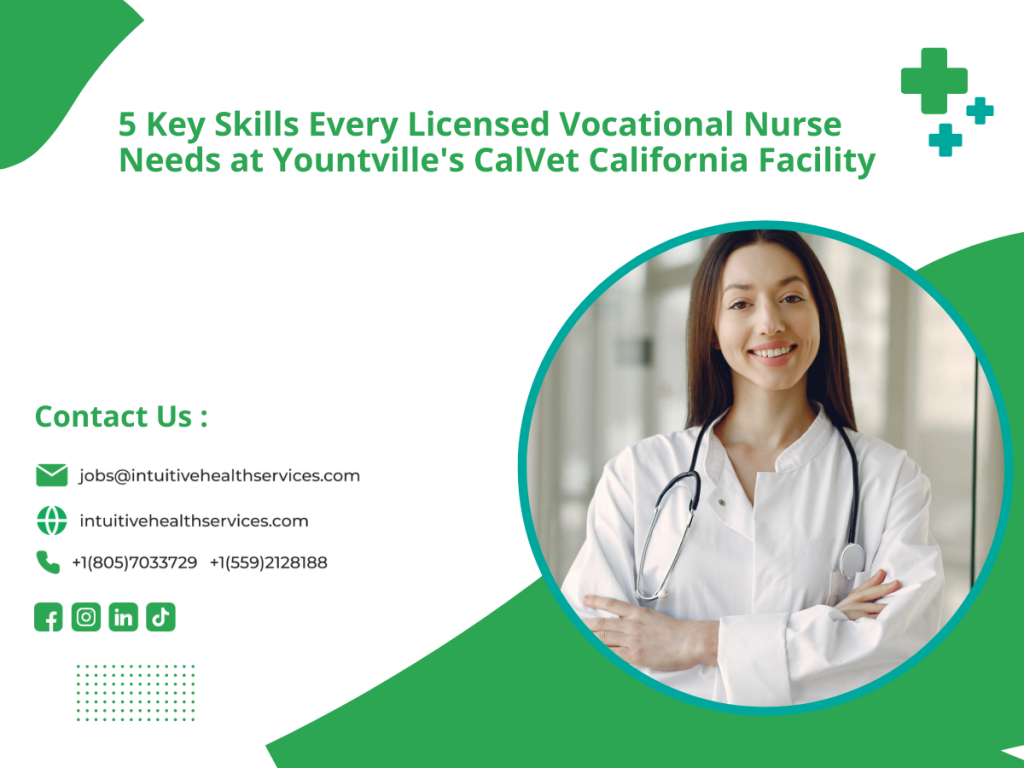As a Licensed Vocational Nurse Needs at Yountville’s CalVet California Facility, you are at the forefront of providing essential care and support to Imperial Locum esteemed veterans. Your role goes beyond administering medication or taking vital signs; it encompasses a diverse set of skills that are crucial for delivering high-quality care and ensuring the well-being of our residents. In this you’ll explore the five key skills every LVN needs to excel in their role at CalVet California.

- Clinical Competence: At the heart of nursing practice lies clinical competence. As an LVN at CalVet California, you must demonstrate proficiency in various clinical tasks, including medication administration, wound care, and monitoring patients’ health status. This involves staying updated on the latest nursing protocols and best practices, as well as being able to adapt your skills to meet the unique needs of our veteran population. Continuously honing your clinical skills through training and hands-on experience is essential for providing safe and effective care.
- Communication Skills: Effective communication is paramount in nursing, particularly in a facility like CalVet California, where teamwork and collaboration are central to providing holistic care. LVNs must be able to communicate clearly and empathetically with patients, their families, and interdisciplinary team members. Whether it’s explaining treatment plans, advocating for patients’ needs, or collaborating with other healthcare professionals, strong communication skills are essential for fostering trust, promoting patient-centered care, and ensuring positive outcomes.
- Critical Thinking and Problem-Solving: Nursing often presents complex and rapidly changing situations that require quick thinking and sound decision-making. LVNs at CalVet California must possess strong critical thinking skills to assess patients’ conditions, identify potential complications, and intervene appropriately. This involves analyzing data, anticipating needs, and implementing timely interventions to optimize patient outcomes. By cultivating a mindset of critical inquiry and problem-solving, LVNs can navigate challenges effectively and deliver proactive, patient-centered care.
- Empathy and Compassion: Caring for veterans at CalVet California requires more than just clinical expertise; it demands a genuine sense of empathy and compassion. Many of our residents have unique medical and psychological needs stemming from their service experiences, and LVNs play a vital role in providing holistic, person-centered care. By showing empathy, listening actively, and validating patients’ experiences, LVNs can establish meaningful connections with residents and contribute to their overall well-being. Compassionate care not only enhances patients’ quality of life but also fosters a supportive and healing environment.
- Adaptability and Resilience: In healthcare, flexibility is key, especially in a dynamic environment like CalVet California. LVNs must be prepared to adapt to changes in patient conditions, organizational protocols, and healthcare technology. This requires resilience in the face of adversity, the ability to remain calm under pressure, and a willingness to embrace new challenges as opportunities for growth. By cultivating adaptability and resilience, LVNs can navigate uncertainties confidently and continue providing high-quality care amidst evolving circumstances.
In conclusion, the role of an LVN at Yountville’s CalVet California facility is multifaceted, requiring a diverse skill set encompassing clinical competence, communication proficiency, critical thinking, empathy, and adaptability. By mastering these key skills, LVNs can fulfill their mission of serving our nation’s veterans with the highest standard of care and compassion. Your dedication and expertise are invaluable in ensuring the health and well-being of those who have sacrificed so much for our country. Thank you for your commitment to excellence in nursing at CalVet California.
Top of Form
